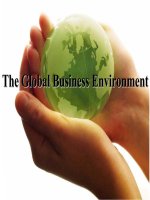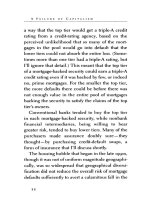Unit 25 global business environment
Bạn đang xem bản rút gọn của tài liệu. Xem và tải ngay bản đầy đủ của tài liệu tại đây (157.98 KB, 13 trang )
Unit 25 Global Business Environment
1
Table of Contents
Introduction......................................................................................................................................2
LO1 Analyse the key factors which drive globalization..................................................................2
P1 Key factors of cost, market, environment, and competition that drive global commerce and
trade..............................................................................................................................................3
M1 Critically analyze the impact that key factors have on the global business environment in
terms of opportunities and challenges..........................................................................................4
LO2 Determine the strategic complexities associated with operating in a global environment......5
P2 Complexity of strategic challenges faced by organizations when operating in a global
environment, supported by specific examples.............................................................................5
M2 Evaluate strategic challenges in the context of risk and diversification and the supply chain
flow..............................................................................................................................................6
LO3 Evaluate how operating in a global market influences an organization's structure, culture,
and functions....................................................................................................................................7
P3 Evaluate the influences of globalization on organizational governance and leadership,
structure, culture, and functions...................................................................................................7
P4 Discuss the influences of ethical and sustainable globalization on organizational functions.8
M3 Critically evaluate the influences of globalization on organizational structure and culture
and functions................................................................................................................................8
LO4 Develop a global strategy to support decision-making for a given organization....................9
P5 Evaluate the different ways that decision-making can work effectively in a global context..9
P6 Devise objectives and strategies to support global decision-making to meet business
objectives.....................................................................................................................................9
M4 Devise strategies that meet a range of different stakeholder perspectives in a global context
....................................................................................................................................................10
Conclusion.....................................................................................................................................10
References......................................................................................................................................11
2
Introduction
The level to which globalization has grown in recent decades was largely due to this fact. There
has been a dramatic increase in international trade and general globalization as a result of the
integration of all nations made possible by technical progress. The term "globalization" is often
used to refer to the growing economic and trade ties between countries around the world.
However, when businesses plan to expand into foreign markets for commercial purposes, they
need to pay attention to a variety of elements that influence the success of their overseas
operations and standing in the global marketplace (Beck, 2018). In this study, the researcher will
discuss the various considerations that must be given to the company's foreign operations. As an
example, this study might use Jaguar, a multinational corporation active in the automobile
industry, as a case company.
LO1 Analyse the key factors which drive globalization
One definition of globalization is the proliferation of cross-border social, economic, political,
and cultural linkages and exchanges. Economic globalization, social globalization, political
globalization, and other aspects of globalization all contribute to its complexity.
Bit of background to Globalisation
The process of globalization had begun previously, but since then, it has expanded considerably.
Globalization, represented by the establishment of the silk route, is often seen as the first
example of the successful interconnection of nations for the sake of commercial exchange.
Europe and Asia were now more connected than ever because of the silk route. As a result, the
need for globalization emerged, and soon after, all economies began focusing on strengthening
their links with one another to facilitate more streamlined commerce (Hall and Werbner, 2020).
Simply put, globalization is the process through which countries become more dependent on one
another as a result of the globalization of trade, finance, ideas, and people. Cost, market,
environment, and rivalry are just some of the many variables propelling globalization.
Introduction of the chosen company
3
Jaguar is a renowned British automaker that also operates on a global scale. The company prides
itself on being a premium luxury carmaker. This business sells high-end items worldwide. The
purpose of this research is to shed light on the example company's activities in the global market.
P1 Key factors of cost, market, environment, and competition that drive global commerce
and trade
The international business community and market are being affected by several important
variables. Factors such as these are broken down in great detail, including:
Cost: The price tag has a significant bearing on the functioning and globalization of the firm.
The economic climate of the country, economies of scale, logistical costs, and all the other cost
elements associated with production and operation management vary from country to country,
and all of them serve as cost drivers. This report suggests that the corporation should pay close
attention to all of these aspects because they have an impact on investments and help propel
globalization (Baldwin, 2022). Accordingly, it can be concluded that the cost element needs to be
considered before entering into any nation, as it would affect the required capital and investment
for the globalization of the firm. When selling their products in other countries, for instance, the
Jaguar corporation in the case study has better watch the bottom line Cherunilam, 2021. Jaguar
sales in a country are impacted by a variety of factors, including the local economy.
Globalization has helped Jaguar save money by reducing the price of shipping in bulk and the
effort put into selling the items.
Market: This consideration suggests that the differences between the global market and the local
market are significant for multinational corporations. Customers' preferences in products and
purchasing habits are influenced by a wide range of market elements, all of which must be taken
into account by businesses (Simona, 2022). Increased competition as a result of globalization is
one of the many market factors affecting Jaguar.
Environment: The corporation places a premium on its operating environment. When a
company prepares to enter a new market first analyze how it will be affected by the local
business climate there. The best country for international expansion can't be chosen until all the
advantages and disadvantages have been weighed. There is a lot of pressure on Jaguar to alter its
4
product lineup and operational procedures to adapt to the rapidly evolving global business
climate. Increasing globalization is claimed to be altering the dynamic corporate environment.
Competition: Among the many crucial considerations that businesses must take into account is
the nature of the competition. This might improve their standing in the global market and provide
them an edge over rivals. To succeed internationally, a company needs to learn everything it can
about its main rivals and the tactics they take to stay in business (Katsikeas et al., 2019). The
analysis should guide the organization in developing new strategies that will help it compete
successfully in international markets. It's no secret that Jaguar's sales are suffering because of the
intense competition they face in the global market. This is why it's crucial for the corporation in
this scenario to devise methods of effectively controlling the rivalry between them.
M1 Critically analyze the impact that key factors have on the global business environment
in terms of opportunities and challenges
When businesses venture into global markets, they face a unique set of difficulties and
opportunities.
Competition Opportunities (Advantages) and challenges (disadvantages)
One of the major difficulties for companies doing business internationally is competing with
multinational behemoths. Thus, it can be concluded that the firm faced a challenge in adapting to
the increased competition and that it was forced to prioritize efficient marketing and product
distinction as a means of dealing with the situation. Nonetheless, the rise of new rivals has
prompted Jaguar to increase its spending on R&D and the breadth of its product offerings to
better serve its global clientele.
Environment, Opportunity (Advantages), and challenges (disadvantages)
The external business environment is influencing every facet of the company's operations. When
a company expands its operations internationally, it faces a new set of opportunities and threats
arising from the region's unique political, social, legal, and economic climate. Jaguar faces
formidable difficulties due to international politics (Hopkinson et al., 2018). In addition, the case
firm has serious challenges from the law, including the various norms and regulations about the
administration of foreign operations. However, now that Jaguar is expanding its operations
5
worldwide, the company has a chance to build a large consumer base, which in turn helps
businesses reap more rewards. The company has the chance to generate sales and grow as a
result of its exposure to a large number of potential customers.
Cost, Opportunity (Advantages), and challenges (disadvantages)
Considered a negative for the business are the elements that drove up the price of investments.
An advantage in terms of cost per unit can be realized, however, if Jaguar's sales were to rise
over the world.
Market, Opportunity (Advantages), and challenges (disadvantages)
The shifting nature of the market provides the organization with an opportunity to improve its
market share and expand its client base. On the other hand, it puts the case firm under pressure to
alter its operations and its products, which is a negative for the business.
Cloud computing and technology (Advantages and disadvantages)
The widespread adoption of new technologies presents fantastic new avenues for product
development. Jaguar is making an effort to use cloud computing and other cutting-edge
technologies in its production processes. Using AI, the company is attempting to alleviate
drivers' anxiety (Antràs, 2020). Other technologies are also employed to lessen the vehicle's
impact on the environment by lowering its fuel consumption and pollution levels, among other
benefits. One of the drawbacks of Jaguar's technology is that it is more expensive to implement.
LO2 Determine the strategic complexities associated with operating in a global
environment
P2 Complexity of strategic challenges faced by organizations when operating in a global
environment, supported by specific examples
Since a company's foreign success is directly tied to the techniques it employs when entering the
market, this is an area where more attention should be paid. Companies operating on a global
scale must pay close attention to complying with a variety of regulations as they go about
running their operations. When overseeing business dealings between countries, it is essential to
6
adhere to international trade law. If they want to effectively manage their cross-border
operations, corporations must shape their strategy by international trade legislation.
Managing a multinational enterprise effectively necessitates a concentrated effort in all aspects of
business management. There are a variety of internal and external business environment issues
that could potentially be problematic for the company. With sales falling and competition rising,
Jaguar Land Rover, a leading automaker, is confronting strategic issues. Sales have been
dropping for the corporation in key regions like Europe, China, and the United States. In
addition, the corporation may face strategic problems due to a variety of other factors, including
rising public awareness of environmental dangers, new rules and regulations, tariffs, more
competition, a slowing economy, and even political instability (SPOTLIGHT, 2023). To improve
their efficiency, businesses operating on a global scale may find it useful to pay close attention to
market trends and adapt their company plans accordingly.
M2 Evaluate strategic challenges in the context of risk and diversification and the supply
chain flow
Effective risk management is a top priority for the world's largest corporations. The potential for
harm that varying environmental conditions and regulatory frameworks provide to businesses is
growing. As a multinational automaker, Jaguar is not immune to the risks posed by several
strategic difficulties. Efforts to boost the business's operational and financial performance are
presenting significant strategic hurdles. As such, businesses must implement methods that will
allow them to successfully deal with these challenges. Jaguar, an automaker with an eye on the
global market, is concentrating on expanding its business by developing and launching a brandnew product at the supply-chain stage (Getahun et al., 2018). They target certain subsets of their
customer base with tailored marketing campaigns. Aside from these problems, businesses also
encounter other supply chain-related problems. Natural disasters, economic difficulties, political
unrest, and other problems can all have an impact on businesses. However, businesses must have
efficient supply chain management methods to keep up with rising client demands. To
successfully manage the many supply chain difficulties and guarantee smooth supply chain flow,
a global company like Jaguar must place a strong emphasis on supply chain diversification.
Companies operating on a worldwide scale are affected by a variety of elements of the
international business climate. Companies are affected in unique ways by the many
7
environmental conditions. If the country's economy were doing well, for instance, more highend, pricey goods would sell. However, if unemployment were to rise in the country, consumers
would be less likely to spend money on luxury items. So, it's safe to say that the company's
global expansion would bring with it a new set of advantages and threats.
LO3 Evaluate how operating in a global market influences an organization's structure,
culture, and functions
P3 Evaluate the influences of globalization on organizational governance and leadership,
structure, culture, and functions
An important part of any organization is its leadership and governance. The company's efforts
should be directed toward accomplishing defined goals and objectives. Then, a system must be
cleared based on the organization's governance. For a company to be successful in the global
market, it must have solid organizational governance in place. Additionally, leadership has a
significant impact on the success of a business, making it essential for a company to have
competent management. The leader's leadership style should be effective if he or she is to inspire
his or her team. This is significant because the advent of globalization necessitates the adoption
of novel approaches, values, and methods in the workplace (Stevenson, 2019). As a result, the
company needs highly driven workers to ensure it receives the best possible output.
As a firm grows internationally, there is typically a commensurate increase in the degree to
which the organization's function must adapt to reflect the new environment. To that end, Jaguar
must prioritize staffing all positions with individuals who bring exceptional levels of expertise
and experience to their work. And consequently, the company's internal structure must also be
revised. Almost all significant corporations throughout the world employ a hierarchical
organizational structure, and that's the one that businesses should use (Nguyen and Tran, 2018).
As a result of globalization, both the structure and the operations of organizations will undergo
significant transformations.
Companies that want to grow internationally will find that globalization has ramifications for
their corporate culture and will require them to make adjustments. All employees should be
treated with dignity and fairness, and the organization should foster a culture that promotes these
ideals. To effectively manage diversity in the workplace and foster greater cooperation and trust
8
among all employees, firms should work to develop a culture that transcends national
boundaries. As a result, Jaguar places a premium on fostering a culture where its employees may
flourish professionally while still upholding the company's high standards of conduct.
P4 Discuss the influences of ethical and sustainable globalization on organisational
functions
A company's concentration on the global market increases the need of conducting business
ethically. In addition, managers of a global company must give their whole attention to making
moral choices and adhering to all applicable business norms. As a result of globalization,
businesses now must treat their suppliers, employees, and consumers with more integrity. There
is also the matter of making sure that the company's global expansion doesn't harm the
environment (Kim and Cavusgil, 2020). Therefore, they should give attention to globalization
that doesn't harm the environment. All of these things have an impact on how a company
operates, and that firm needs to be more environmentally conscious in how it does its day-to-day
business.
M3 Critically evaluate the influences of globalization on organizational structure and
culture and functions
The effects of globalization on the structure and culture of the company are substantial. Because
of the impact globalization will have on all of the McKinsey 7s model's components, the
organization should prioritize adhering to all of them. The company's structure, style, skills, staff,
strategy, and system should all work together to achieve success. They should also foster an
environment that values and encourages diversity among employees. Organizational
effectiveness is being impacted from the inside out, thus it makes sense for the organization to
concentrate on these issues as it expands internationally.
LO4 Develop a global strategy to support decision-making for a given organization
P5 Evaluate the different ways that decision-making can work effectively in a global
context
Companies need to be able to make good decisions that will help them function properly in the
worldwide business climate. When a company sets its sights on the global market, it faces stiffer
competition. To survive in this environment, businesses need to concentrate on creating winning
9
methods to deal with other firms. The spread of globalization has made it easier for people to
learn about the customs and beliefs of others around the world. Since the company operates on a
global scale, the pressure on its management to consider all of these factors is significant. There
needs to be a shift in leadership. As a result of globalization, there is now a far more diverse
workforce, necessitating the use of participatory transformational leadership by global business
executives to effectively manage their organizations (Lang and Tavares, 2018). Also included are
several approaches to administration, marketing, pricing, and everything else. Consumers can
now easily research products online, therefore businesses must maintain relatively consistent
pricing throughout all of their marketplaces.
P6 Devise objectives and strategies to support global decision-making to meet business
objectives
Growing a company to the point where it can compete in the global market and trade on a global
scale is no simple task. The corporation's priority should be determining the best strategy for
becoming global. Also, they have to overcome several obstacles before they can succeed in the
worldwide market. Below, we list some of the common methods of becoming global:
There isn't a simpler path to global success than this one. When this happens, the item is
shipped to another country to be sold there (Schellenberg et al., 2018). Although this
necessitates fewer legal safeguards, trade connections between nations remain a hurdle.
Only when there are strong trade ties between the two countries and minimal tariffs can
exports take place.
Here, the foreign firm uses a global licensing arrangement to market products made by
the producing firm. Fast food chains such as McDonald's and KFC, for instance, operate
solely through the franchising and licensing of their trademarks. This form of
internationalization enables businesses to develop with a minimal outlay of capital.
To join and succeed in a foreign market, the company employs a strategic alliance with a
local partner. International expansion has been greatly aided by the rise in popularity of
strategic alliances and joint ventures in recent decades.
10
M4 Devise strategies that meet a range of different stakeholder perspectives in a global
context
When a company is trying to break into the global market, there are several obstacles it must
overcome. When a business expands into foreign markets, the vast cultural variations across
countries can provide significant challenges. To remedy this, businesses can put effort into
developing a workplace culture that encourages employees to learn about and appreciate other
cultures. When conducting business on a global scale, companies must comply with all
applicable laws and regulations (Burlacu et al., 2018). Businesses should cater their product
selection to what their target demographic wants and needs, taking into account their
demographic and other societal considerations. The company's choice of worldwide expansion
plan is a crucial aspect of its eventual success. Therefore, it is suggested that the firm pay
attention to all of the aspects related to the external business environment and its possible impact
on the firm, and then employ an efficient mode of entry into the firm.
Conclusion
The researcher's primary objective in the aforementioned report was to outline the various
considerations that should be made before venturing abroad. In the end, the paper indicates that
globalization has a significant effect on the structure, functions, culture, and operations of every
given organization. Therefore, management should work on refining the company's strategies
and instituting changes to the company's culture that will facilitate a successful foray into
international markets. In addition, while going global, businesses need to adopt the right entry
mode and employ more effective marketing and PR techniques to establish a solid reputation.
11
References
Antràs, P., 2020. De-globalisation? Global value chains in the post-COVID-19 age (No.
w28115). National Bureau of Economic Research.
Baldwin, R., 2022. Globotics and macroeconomics: Globalisation and automation of the service
sector (No. w30317). National Bureau of Economic Research.
Beck, U., 2018. What is globalization?. John Wiley & Sons.
Burlacu, S., Gutu, C. and Matei, F.O., 2018. Globalization–pros and cons. Calitatea, 19(S1),
pp.122-125.
Cherunilam, F., 2021. Business environment. Himalaya Publishing House Pvt. Ltd.
Getahun, W., Tesfaye, A., Mamo, T. and Ferede, S., 2018. Apple value chain analysis in the
Central Highlands of Ethiopia. Int. J. Agric. Innov. Res, 7(1), pp.2319-1473.
Hall, S. and Werbner, P., 2020. Cosmopolitanism, Globalisation and Diaspora 1. In Anthropology
and the new cosmopolitanism (pp. 345-360). Routledge.
Hopkinson, P., Zils, M., Hawkins, P. and Roper, S., 2018. Managing a complex global circular
economy business model: opportunities and challenges. California Management Review, 60(3),
pp.71-94.
Katsikeas, C., Leonidou, L. and Zeriti, A., 2019. Revisiting international marketing strategy in a
digital era: Opportunities, challenges, and research directions. International Marketing Review.
Kim, D. and Cavusgil, E., 2020. Antecedents and outcomes of digital platform risk for
international new ventures’ internationalization. Journal of World Business, 55(1), p.121.
Lang, V.F. and Tavares, M.M.M., 2018. The distribution of gains from globalization.
International Monetary Fund.
Naik, P., 2020. The Science-Fictionalisation of Globalisation and Image Advertising in Harvest
by
Manjula
Padmanabhan. Fafnir–Nordic
Journal
of
Science
Fiction
and
Fantasy
Research, 7(1), pp.14-26.
12
Nguyen, N. and Tran, L.T., 2018. Looking inward or outward? Vietnam higher education at the
superhighway of globalization: culture, values, and changes. Journal of Asian Public Policy,
11(1), pp.28-45.
Schellenberg, M., Harker, M.J. and Jafari, A., 2018. International market entry mode–a
systematic literature review. Journal of Strategic Marketing, 26(7), pp.601-627.
Simona, S., 2022. Globalisation and Maternal Health Care Utilisation in sub-Saharan Africa: A
Bayesian Multilevel Analysis. medRxiv.
SPOTLIGHT, C.L., 2023. IBF Talks To CEO of Jaguar Land Rover, Sir Ralf Speth.
Stevenson, H., 2019. LEADERSHIP AND GLOBALISATION. Principles of Educational
Leadership & Management, p.275.
13









